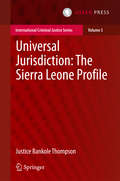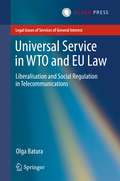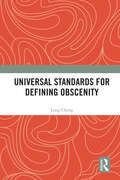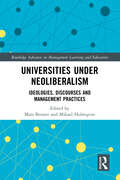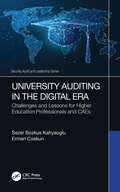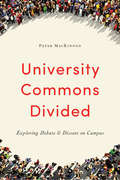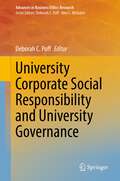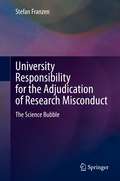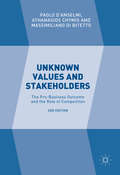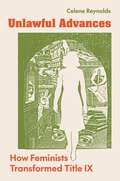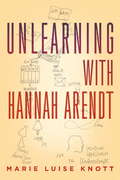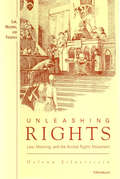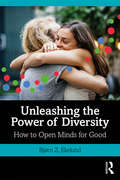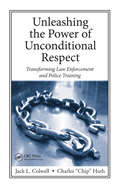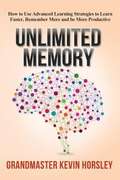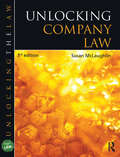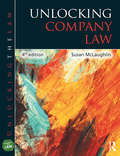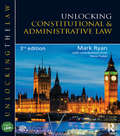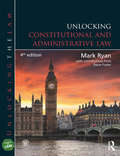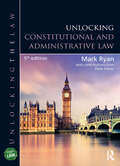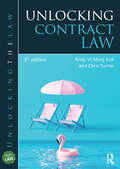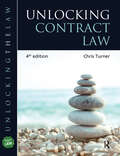- Table View
- List View
Universal Jurisdiction: The Sierra Leone Profile
by Bankole ThompsonThe doctrine of universal jurisdiction has evolved throughout modern times in the context of global criminal justice as a paramount agent of combating impunity emanating from international criminality. Sierra Leone, as a member of the international community and the United Nations, has, in recent times, been a pioneer in the progressive application and development of international criminal law in the African region. Despite this role, the country's profile, both in terms of the incorporation and application of the doctrine of universal jurisdiction, is deficient in several major respects falling far short of its dual international obligation not to provide safe havens from justice for perpetrators of international crimes and to combat impunity from such criminogenic acts. Hence, a compelling reason for the author to write this book was to provide a seminal scholarly work on the subject articulating the existing state of the law in Sierra Leone and highlighting the deficiencies in the law and factors inhibiting the exercise of universal jurisdiction in this UN member state. It was also to propose necessary substantive and procedural law reforms in the state's jurisprudence on the subject. The book is recommended reading for practitioners and scholars in international criminal law and related disciplines. Its accessibility is highly enhanced by relevant tables and summaries of each chapter. Justice Rosolu J. B. Thompson is Professor Emeritus of Criminal Justice Studies, Eastern Kentucky University, USA. He was a member of and Presiding Judge in Trial Chamber I of the Special Court for Sierra Leone.
Universal Service in WTO and EU law
by Olga BaturaThis book is a systematic comparative study of WTO and EU law relevant for universal service provision, and a timely contribution to the ongoing scholarly and policy debates about the concept and scope of universal service. Universal service is one of the most significant regulatory issues worldwide and it is likely to remain so. The central question dealt with by the author is how the technologically intensive sector of telecommunications services can be regulated in a socially fair way in the light of liberalisation and the immense importance of ICTs in the Information Society. The author investigates whether the legal frameworks of WTO and EU can meet the challenges of the rapid and dramatic technological and social change and formulates relevant policy recommendations. The book is of interest to both scholars and practitioners in several disciplines, such as EU and WTO law, telecommunications law and regulation, political science regarding market regulation and governance as well as European integration and WTO. Olga Batura is affiliated to the Leuphana Law School, University of Lüneburg, Germany, and to the European Humanities University in Vilnius, Lithania.
Universal Standards for Defining Obscenity
by Long ChengIn the existing literature, there is no universal standard for defining obscenity. The book aims to demonstrate that there indeed exist underlying universal standards for defining obscenity (USDOs). However, their application to different contexts of time, place, and culture, may legitimately result in varied manifestations.The author examines a definition of obscenity proposed by the political and legal theorist Harry M. Clor, within John Finnis’ natural law theoretical framework. He also explores how positive law, including legislation, case law, and customary law, should respond to the proposed USDOs. The book addresses the theoretical foundation of the determination and regulation of obscenity, and it is supplemented with examples of legal practices from several jurisdictions, such as the United States, the United Kingdom, Canada, and Germany.The book will appeal to scholars of legal philosophy, natural law theories, obscenity law, and free speech.
Universities under Neoliberalism: Ideologies, Discourses and Management Practices (Routledge Advances in Management Learning and Education)
by Mats Benner Mikael HolmqvistThe COVID-19 pandemic, the surge of populism, the climate crisis and many other destabilizing factors in our time, all point at the expectation of trustworthy knowledge and reliable organization devoted to knowledge production and dissemination. However, universities remain enmeshed in economic liberalization and ensuing cultural struggles where their funding, governance and practices reflect market imprints – even academic ideals such as originality, or social ideals such as relevance have been transformed into measurable units and thereby risk losing their historical sway. This predicament is the focus of this book. The book explores the rise of neo-liberalization in academic system in a highly unlikely place: Sweden, a country with a strong social democratic tradition and a long history of state regulation of higher education. As an advanced welfare state with a powerful labour movement and a large public sector, market ideals and practices have been carefully curtailed historically. This notwithstanding, a neoliberal university model has evolved there, reshaping notions of academic identities, institutional directions and notions of quality. This edited collection will be of value to researchers, academics and students with an interest in organizational studies, governance, management, higher education, sociology and politics.
University Auditing in the Digital Era: Challenges and Lessons for Higher Education Professionals and CAEs (Security, Audit and Leadership Series)
by Sezer Bozkus Kahyaoglu Erman CoskunThis book explores how digital transformation is reshaping the manner in which higher education sectors emerge, work, and evolve and how auditors should respond to this challenging and risky digital audit universe in transforming the higher education system. It serves to help professionals to understand the reality of performing the Chief Audit Executive (CAE) role in today’s evolving business economy, specifically in the higher education sector. It compares and contrasts the stated IIA standards with the challenges and realities auditors may face and provides alternative scenarios to gaining a "seat at the table." This book also provides insight into critical lessons learned when executing the CAE role relevant for digitally transforming universities. The main purpose of this study is to rethink the audit culture in the digital era and reveal the key characteristics that are open for improvement so that digitally transforming universities can be audited according to the higher education standards with a digitally supported value-added audit approach. Based on this approach, the audit culture is reassessed considering the digital university conceptual framework and business model. There are two main points to consider for the digital university work environment: traceability and auditability. In this respect, policy recommendations are made for best practices to achieve value-added digital audits in transforming universities. The book has been written from both the reality and academic perspectives of two experienced authors. Sezer is a past CAE, CEO, and long-term senior internal auditor who has worked in the internal audit role for various listed companies, financial institutions, and government entities. Erman has extensive information technology and university accreditation knowledge in the global higher education sector. This brings a blend of value-added approaches to the readers and speaks to issues about understanding and dealing with audit culture and business evolution in digitally transforming organizations along with the requirements for upholding IIA standards. Geared toward the experienced or new CAE, University Auditing in the Digital Era: Challenges and Lessons for Higher Education Professionals and CAEs can be a tool for all auditors to understand some of the challenges, issues, and potential alternative solutions when executing the role of university auditing. In addition, it can be a valuable reference for university administrators and CIOs, as well as academics and all stakeholders related to the higher education sector.
University Commons Divided: Exploring Debate and Dissent on Campus
by Peter MacKinnonIn recent years, a number of controversies have emerged from inside Canadian universities. While some of these controversies reflect debates occurring at a broader societal level, others are unique to the culture of universities and the way in which they are governed. In University Commons Divided, Peter MacKinnon provides close readings of a range of recent incidents with a view to exploring new challenges within universities and the extent to which the idea of the university as ‘commons,’ a site for open and contentious disagreement, may be under threat. Among the incidents addressed in this book are the Jennifer Berdahl case in which a UBC professor alleged a violation of her academic freedom when she was phoned by the university's board chair to discuss her blog on which she speculated about the reasons for the university president's departure from office; the case of Root Gorelick, a Carleton University biologist and member of the university’s board of governors who refused to sign a code of conduct preventing public discussion of internal board discussions; the Facebook scandal at Dalhousie University’s Faculty of Dentistry in which male students posted misogynistic comments about their female classmates. These and many other examples of turmoil in universities across the country are used to reach new insights on the state of freedom of expression and academic governance in the contemporary university. Accessibly written and perceptively argued, University Commons Divided is a timely and bold examination of the pressures seeking to transform the culture and governance of universities.
University Corporate Social Responsibility and University Governance (Advances in Business Ethics Research #8)
by Deborah C. PoffThis book provides new and original research on the purpose and functions of universities from the perspective of corporate social responsibility. It addresses professional ethics questions that relate to universities as corporate citizens. Divided into two sections, the book starts out with an examination of the concept of universities. It explores the differences between historic and contemporary universities, the history and nature of university governance, the role of higher education, and the problem of domination and subjugation in a management context. The second section looks at the faculty, the students, and the role of spirituality in the university and research. It examines such themes as the nature of faculty and professors, faculty as change agents, diversity, inclusivity and incivility, academic integrity, citizenship of students, and ethical responsibility of researchers. The book calls on the expertise from both the fields of business and professional ethics and university management and leadership. It approaches the subject from an interdisciplinary perspective.
University Responsibility for the Adjudication of Research Misconduct: The Science Bubble
by Stefan FranzenThis book offers a scientific whistleblower’s perspective on current implementation of federal research misconduct regulations. It provides a narrative of general interest that relates current cases of research ethics to philosophical, historical and sociological accounts of fraud in scientific research. The evidence presented suggests that the problems of falsification and fabrication remain as great as ever, but hidden because the current system puts universities in charge of investigations and permits them to use confidentiality regulations to hide the outcomes of investigations. The book documents the significant conflict of interest that arises because federal regulation gives universities the responsibility to conduct investigations of their own faculty with severely limited oversight. The book is intended for young research scientists or anyone who wishes to understand the challenges faced by scientists in the workplace today. The central thread in the book is an exclusive account of an experienced research scientist who was the first to expose the facts that led to the longest running research misconduct investigation in the history of the National Science Foundation.
Unjust Deeds
by Jeffrey D. GondaIn 1945, six African American families from St. Louis, Detroit, and Washington, D.C., began a desperate fight to keep their homes. Each of them had purchased a property that prohibited the occupancy of African Americans and other minority groups through the use of legal instruments called racial restrictive covenants--one of the most pervasive tools of residential segregation in the aftermath of World War II. Over the next three years, local activists and lawyers at the NAACP fought through the nation's courts to end the enforcement of these discriminatory contracts. Unjust Deeds explores the origins and complex legacies of their dramatic campaign, culminating in a landmark Supreme Court victory in Shelley v. Kraemer (1948). Restoring this story to its proper place in the history of the black freedom struggle, Jeffrey D. Gonda's groundbreaking study provides a critical vantage point to the simultaneously personal, local, and national dimensions of legal activism in the twentieth century and offers a new understanding of the evolving legal fight against Jim Crow in neighborhoods and courtrooms across America.
Unknown Values and Stakeholders: The Pro-Business Outcome and the Role of Competition
by Athanasios Chymis Paolo D'Anselmi Massimiliano Di BitettoThis second edition demonstrates that there are more conditions and actors prevalent in the economy than are considered today, and builds a balanced view of responsibility that would not be shunned by corporate executives. The wider economic responsibilities of organizations have been identified for corporations, and responsibility has been focused on business. Unknown Values and Stakeholders argues that all organizations, including public administration, should be accountable for their economic responsibilities. The authors reveal the unknown values and stakeholders of the accountability game and the new inequality in working conditions of the employed while, at the same time, showing a path towards effective economic development.
Unlawful Advances: How Feminists Transformed Title IX
by Celene ReynoldsThe remarkable story of the women who defined sexual harassment as unlawful sex discrimination under Title IXWhen the US Congress enacted Title IX of the Education Amendments of 1972, no one expected it to become a prominent tool for confronting sexual harassment in schools. Title IX is the civil rights law that prohibits education programs from discriminating &“on the basis of sex.&” At the time, however, the term &“sexual harassment&” was not yet in use; this kind of misconduct was simply accepted as part of life for girls and women at schools and universities. In Unlawful Advances, Celene Reynolds shows how the women claiming protection under Title IX made sexual harassment into a form of sex discrimination barred by the law. Working together, feminist students and lawyers fundamentally changed the right to equal opportunity in education and schools&’ obligations to ensure it.Drawing on meticulously documented case studies, Reynolds explains how Title IX was applied to sexual harassment, linking the actions of feminists at Cornell, Yale, and Berkeley. Through analyses of key lawsuits and an original dataset of federal Title IX complaints, she traces the evolution of sexual harassment policy in education—from the early applications at elite universities to the growing sexual harassment bureaucracies on campuses today—and how the work of these feminists has forever shaped the law, university governance, and gender relations on campus. Reynolds argues that our political and interpretive struggle over this application of Title IX is far from finished. Her account illuminates this ongoing effort, as well as the more general process by which citizens can transform not only the laws that govern us, but also the very meaning of equality under American law.
Unlawful Contact: I-Team 3 (I-Team)
by Pamela ClareFans of Suzanne Brockmann, Maya Banks, Christy Reece, Julie Ann Walker and Cindy Gerard will adore Pamela Clare's expertly plotted romantic suspense series, which sets the pages alight with sizzling chemistry. For tension, thrills, romance and passion take a spin with the I-Team.Taken hostage by a convicted murderer while reporting at a prison, Sophie Alton has no idea that the man holding the gun to her head is the bad boy who was her first love in high school. Condemned to life without parole, Marc Hunter finds himself with no choice but to break out of prison after his younger sister disappears with her baby. Though he regrets what he has to put Sophie through, he can't let anything get in the way of stopping the corrupt officials who are set on destroying what's left of his family. But being near Sophie rekindles memories for both of them. And, as the passion between them heats up, so does the conspiracy to put both of them in their graves...Sexy. Thrilling. Unputdownable. Take a wildly romantic ride with Pamela Clare's I-Team: Extreme Exposure, Hard Evidence, Unlawful Contact, Naked Edge, Breaking Point, Striking Distance, Seduction Game.
Unlawful Killings: Life, Love and Murder: Trials at the Old Bailey - The instant Sunday Times bestseller
by Her Honour Wendy JosephTHE INSTANT SUNDAY TIMES BESTSELLERWINNER OF THE CWA GOLD DAGGER FOR NON-FICTION 2023'Wendy Joseph's gripping account of the law at work reads like a cliffhanger.' Sunday Times'Absolutely superb. 5 stars for sheer readability alone. Her Honour entertains as she educates us about murder, about the law and about how we human beings are shaped as we create the culture we live with.' PHILIPPA PERRY, author of THE BOOK YOU WISH YOUR PARENTS HAD READ___________________________________________________________________________________'Every day in the UK lives are suddenly, brutally, wickedly taken away. Victims are shot or stabbed. Less often they are strangled or suffocated or beaten to death. Rarely they are poisoned, pushed off high buildings, drowned or set alight. Then there are the many who are killed by dangerous drivers, or corporate gross negligence. There are a lot of ways you can kill someone. I know because I've seen most of them at close quarters.'High-profile murder cases all too often grab our attention in dramatic media headlines - for every unlawful death tells a story. But, unlike most of us, a judge doesn't get to turn the page and move on. Nor does the defendant, or the family of the victim, nor the many other people who populate the court room.And yet, each of us has a vested interest in what happens there. And while most people have only the sketchiest idea of what happens inside a Crown Court, any one of us could end up in the witness-box or even in the dock.With breath-taking skill and deep compassion, the author describes how cases unfold and illustrates exactly what it's like to be a murder trial judge and a witness to human good and bad. Sometimes very bad.The fracture lines that run through our society are becoming harder and harder to ignore. From a unique vantage point, the author warns that we do so at our peril._____________________________________________________________________________________________'The most exceptional book I have read in a long time.' CLARE MACKINTOSH'A very rare gem. written with authority, humility and compassion. Compellingly clever and sharply honest.' PROFESSOR DAME SUE BLACK, author of ALL THAT REMAINS'Riveting, thought-provoking, and very, very entertaining. I loved it.' RODDY DOYLE'Will make you question all the fundamentals that you've come to take for granted about offenders, the crimes that they commit - especially murder - and the punishment they deserve. A page turner that will leave you wanting to know more.' EMERITUS PROFESSOR DAVID WILSON, author of MY LIFE WITH MURDERERSThe instant Sunday Times bestseller, March 2023
Unlearning with Hannah Arendt
by Marie Luise KnottShort-listed for the Tractatus Essay Prize, an examination of the innovative strategies Arendt used to achieve intellectual freedom After observing the trial of Adolf Eichmann, Hannah Arendt articulated her controversial concept of the "banality of evil," thereby posing one of the most chilling and divisive moral questions of the twentieth century: How can genocidal acts be carried out by non-psychopathic people? By revealing the full complexity of the trial with reasoning that defied prevailing attitudes, Arendt became the object of severe and often slanderous criticism, losing some of her closest friends as well as being labeled a "self-hating Jew." And while her theories have continued to draw innumerable opponents, Arendt's work remains an invaluable resource for those seeking greater insight into the more problematic aspects of human nature. Anchoring its discussion in the themes of translation, forgiveness, dramatization, and even laughter, Unlearning with Hannah Arendt explores the ways in which this iconic political theorist "unlearned" recognized trends and patterns--both philosophical and cultural--to establish a theoretical praxis all her own. Through an analysis of the social context and intellectual influences--Karl Jaspers, Walter Benjamin, and Martin Heidegger--that helped shape Arendt's process, Knott has formed a historically engaged and incisive contribution to Arendt's legacy.
Unleashing Rights: Law, Meaning, and the Animal Rights Movement
by Helena SilversteinUnleashing Rightsis a study of the animal rights movement's efforts to advance social reform through the deployment of legal language and practices. The study looks at how prevailing understandings of rights language have shaped the attempt to put forth the idea that animals have rights, and how this attempt, in turn, offers the opportunity to reconstruct the meaning of rights. The book also examines the way litigation has influenced the movement's activities and opportunities for success. Presented here is an investigation of the legal system through a decentered, cultural approach. Legal languages and practices are viewed as a part of everyday life--constructed, used, and interpreted not only by those who run official legal institutions but also by everyday people with a legal consciousness. Using this approach, the book questions whether the deployment of rights and litigation by animal rights advocates has challenged prevailing legal meaning. Looking to both the constitutive and instrumental aspects of law, and to how each informs the other,Unleashing Rightsfinds that the resort to rights and litigation has advanced movement goals and contributed to alternative constructions of legal meaning. The study concludes that despite their many constraints, both rights talk and litigation are powerful resources for those who seek change, especially when used by strategically minded activists. Unleashing Rightsis a book that illustrates the relationship between law, social movement activism, and social change. The book joins the ongoing debate within public law scholarship that is concerned with the effectiveness of legal strategies and languages. The book also speaks to those interested in the general study of social movements and in the particular study of the animal rights movement. With its cultural approach focused on rights language and the construction of meaning, the work will be of interest to the disciplines of law and political science, as well as those who study sociology, anthropology, and philosophy. Helena Silverstein is F. M. Kirby Assistant Professor of Government and Law, Lafayette College.
Unleashing the Power of Diversity: How to Open Minds for Good
by Bjorn Z. EkelundUnleashing the Power of Diversity provides a clear tool to create a common language across teams and organisations that reinforces positive identity, builds trust towards people and processes, supports innovation and helps make diversity sustainable. The complex problems that many organisations and teams now face are global in scope, including cultural, social and environmental issues. Challenges such as climate change, mass migration and human rights do not respect national borders or sociodemographic groups. In order to solve these complex problems, we need the skills to be able to communicate effectively across the differences that may otherwise divide us. In this ground-breaking book, award-winning consultant and author, Bjørn Z. Ekelund, presents a clear step-by-step approach to communicate with people who have different mindsets, perspectives and cultural backgrounds. It is relevant and applicable across various contexts – within the workplace, inter-professional, across different industries and cultures, and between corporate, governmental and NGO groups. The programme developed in the book, called the Diversity Icebreaker, has been successfully applied across 70 countries and with 250,000 participants. It shows how to break down these barriers and provides a new way to conceptualise diversity across various boundaries, allowing for trust and unity to form and creating a pathway for improving communication.
Unleashing the Power of Unconditional Respect: Transforming Law Enforcement and Police Training
by Jack Colwell Charles HuthEvery day, police officers face challenges ranging from petty annoyances to the risk of death in the line of duty. Coupled with these difficulties is, in some cases, lack of community respect for the officers despite the dangers these men and women confront while protecting the public. Exploring issues of courage, integrity, leadership, and charact
Unlimited Memory: How to Use Advanced Learning Strategies to Learn Faster, Remember More and Be More Productive
by Kevin HorsleyIn Unlimited Memory, you'll learn how the world's best memory masters get themselves to concentrate at will, anytime they want. When you can easily focus and concentrate on the task at hand, and store and recall useful information, you can easily double your productivity and eliminate wasted time, stress and mistakes at work. In this book, you'll find all the tools, strategies and techniques you need to improve your memory.
Unlocking Company Law
by Susan McLaughlinUnlocking Company Law will help you grasp the main concepts of Company Law with ease. Containing accessible explanations in clear and precise terms that are easy to understand, it provides an excellent foundation for learning and revising. The information is clearly presented in a logical structure and the following features support learning helping you to advance with confidence: Clear learning outcomes at the beginning of each chapter set out the skills and knowledge you will need to get to grips with the subject Key Facts boxes throughout each chapter allow you to progressively build and consolidate your understanding End-of-chapter summaries provide a useful check-list for each topic Cases and judgments are highlighted to help you find them and add them to your notes quickly Frequent activities and self-test questions are included so you can put your knowledge into practice Sample essay questions with annotated answers prepare you for assessment Glossary of legal terms clarifies important definitions This edition has been updated to include key recent changes and developments in company law, both case law and statutory. Two recent Supreme Court decisions on piercing the corporate veil, VTB Capital plc v Nutritek International Corp and others and Prest v Petrodel Resources Limited & Others, are examined, as is Popplewell J’s detailed judgment on directors’ duties in Madoff Securities International Limited (In Liquidation) v Raven and others. Important new provisions for binding votes and detailed disclosure of directors’ remuneration, changes to the company charges registration and narrative reporting regimes and new rules facilitating private company share reductions/buy-backs are outlined as are imminent developments included in the 2014 Deregulation Bill (stemming from the Government Red Tape Challenge). Commitment of the EU and UK Government to improving corporate governance of small and medium-sized enterprises (SMEs) makes core company law, the focus of this book, more relevant than ever. The books in the Unlocking the Law Series get straight to the point and offer clear and concise coverage of the law, broken-down into bite-size sections with regular recaps to boost your confidence. They provide complete coverage of both core and popular optional law modules, presented in an innovative, visual format and are supported by a website which offers students a host of additional practice opportunities.
Unlocking Company Law (Unlocking the Law)
by Susan McLaughlinUnlocking Company Law is the ideal resource for learning and revising Company Law. This 4th edition has been extensively updated, and this, along with its many pedagogical features, makes it the ideal companion for students studying Company Law. Each chapter in the book contains: • aims and objectives; • activities such as self-test questions; • charts of key facts to consolidate your knowledge; • diagrams to aid memory and understanding; • prominently displayed cases and judgments; • chapter summaries; • essay questions with answer plans. In addition, the book features a glossary of legal terminology, making the law more accessible.
Unlocking Constitutional and Administrative Law (Unlocking the Law)
by Mark Ryan Steve FosterConstitutional and administrative law (Public law) is an essential element of all law degrees. UNLOCKING CONSTITUTIONAL & ADMINISTRATIVE LAW will ensure that you grasp the main concepts with ease, providing you with an indispensable foundation in the subject. This revised third edition is fully up-to-date with the latest key changes in the law. The UNLOCKING THE LAW series is designed specifically to make the law accessible. Each chapter contains: aims and objectives, activities such as self-test questions, key facts charts to consolidate your knowledge diagrams to aid memory and understanding prominently displayed cases and judgments chapter summaries a glossary of legal terminology essay questions with answer plans. The series covers all the core subjects required by the Bar Council and the Law Society for entry onto professional qualifications as well as popular option units. The website www.unlockingthelaw.co.uk provides free resources such as multiple choice questions and updates to the law.
Unlocking Constitutional and Administrative Law (Unlocking the Law)
by Mark Ryan Steve FosterConstitutional and administrative law (public law) is an essential element of all law degrees. Unlocking Constitutional and Administrative Law will ensure that you grasp the main concepts with ease, while giving you an indispensable foundation in the subject. This revised fourth edition is fully up to date with the latest key changes in the law and constitutional developments. The UNLOCKING THE LAW series is designed specifically to make the law accessible. Each chapter contains: aims and objectives; activities such as self-test questions; charts of key facts to consolidate your knowledge; diagrams to aid memory and understanding; prominently displayed cases and judgments; chapter summaries; a glossary of legal terminology; essay questions with answer plans. The series covers all the core subjects required by the Bar Council and the Law Society for entry onto professional qualifications as well as popular option units.
Unlocking Constitutional and Administrative Law (Unlocking the Law)
by Mark Ryan Steve FosterUnlocking Constitutional and Administrative Law provides an indispensable foundation in this core law curriculum subject, ensuring that you grasp the main concepts with ease. Containing accessible explanations in clear and precise terms that are easy to understand, it provides an excellent foundation for learning and revising Constitutional and Administrative Law. The information is clearly presented in a logical structure and the following features support learning, helping you to advance with confidence: Clear aims and objectives at the beginning of each chapter set out the skills and knowledge you will need to get to grips with the subject Key Facts summaries throughout each chapter allow you to progressively build and consolidate your knowledge Diagrams to aid memory and understanding Cases and judgments are highlighted to help you find them and add them to your notes quickly End-of-chapter summaries provide a useful checklist for each topic Frequent activities and self-test questions are included so you can put your knowledge into practice Glossary of legal terminology clarifies important definitions. This edition has been fully updated to include discussion of recent changes, issues and developments since the last edition, including an expanded section on Brexit, proposed changes to Judicial review, developments in Wales, Ireland and Scotland, recent Bills raising issues concerning the rule of law, and a new chapter on the constitutional impact of COVID-19.
Unlocking Contract Law (Unlocking the Law)
by Chris Turner Andy Vi-Ming KokContract Law is a core element of every law degree in England and Wales. Now in its 5th edition, Unlocking Contract Law will help you grasp the main concepts of the subject with ease.Containing accessible explanations in a clear and logical structure, the following features support learning, helping you to advance with confidence:• Clear learning outcomes at the beginning of each chapter set out the skills and knowledge you will need to get to grips with the subject;• Key Facts summaries throughout each chapter allow you to progressively build and consolidate your understanding;• End-of-chapter summaries provide a useful check-list for each topic;• Cases and judgments are highlighted to help you find them and add them to your notes quickly;• Frequent activities and self-test questions and sample essay questions are included so you can put your knowledge into practice and prepare you for assessment;• A brand new ‘critiquing the law’ feature is designed to foster essential critical thinking skills.The 5th edition has been fully updated throughout to reflect recent developments and changes in the law, including the growing focus on consumer protection within contract law as well as the influence of technology on contracts, including email signatures and online transactions. Unlocking Contract Law is essential reading for all students studying Contract Law for the first time.
Unlocking Contract Law (Unlocking the Law)
by Chris TurnerThe Unlocking the Law series makes the law accessible. Each chapter contains activities such as quick quizzes and self-test questions, key facts charts to consolidate your knowledge and diagrams to aid learning. Cases, judgments and primary source quotations are prominently displayed. Summaries help you understand each chapter, there is a glossary of legal terminology. New features include problem questions with guidance on answering, as well as essay questions and answer plans, plus cases and materials exercises. All titles in the series follow the same formula and include the same features so students can move easily from one subject to another. www.unlockingthelaw.co.uk provides free resources such as multiple choice questions, key questions and answers, revision mp3s and cases and materials exercises.
